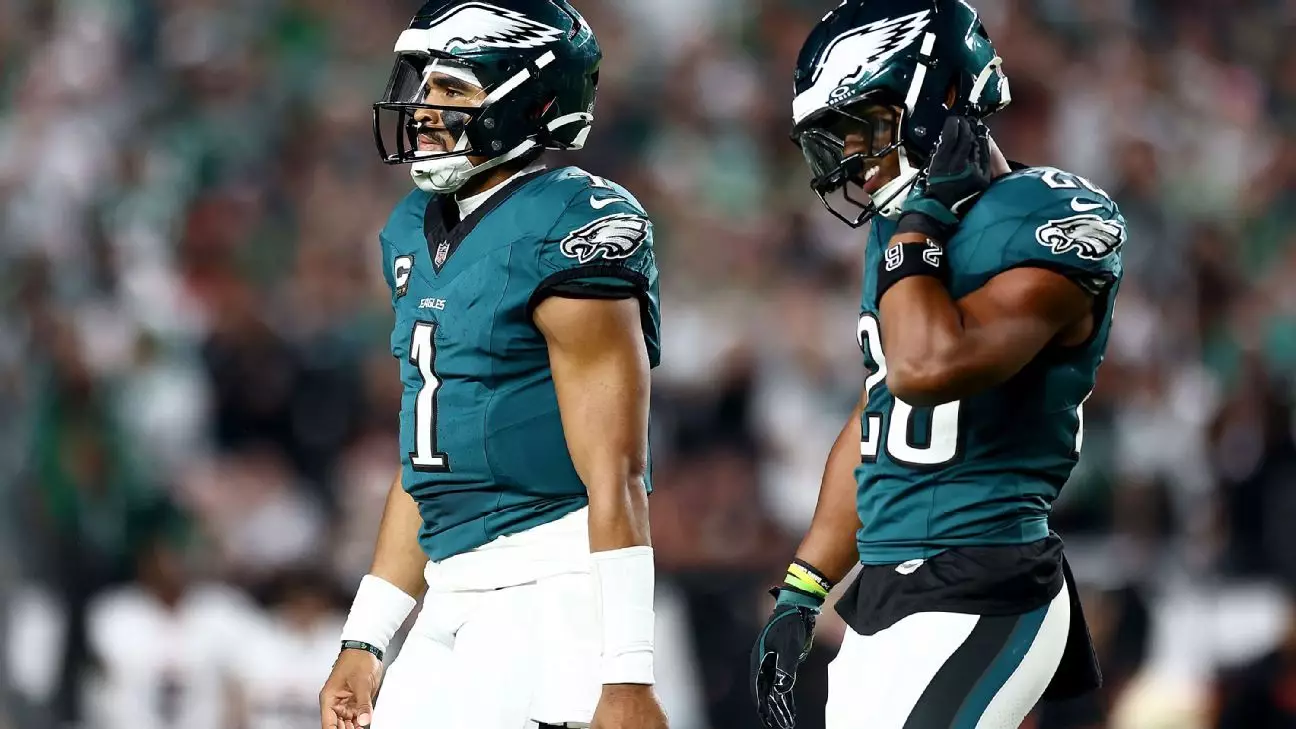The Philadelphia Eagles faced the Atlanta Falcons in a nail-biting matchup, where a single play shifted the momentum and ultimately sealed their fate. While the game’s final score — a narrow 22-21 loss — left the team and fans disheartened, the pivotal moment came late in the fourth quarter when running back Saquon Barkley dropped an easy pass that could have secured a victory. This moment raises not only questions about individual accountability but also reflects the intricate dynamics of team sports, including decision-making processes and the weight of expectations on players.
As the clock wound down, the Eagles clung to a slender three-point lead, and the situation seemed favorable. Barkley, who had returned to prominence following a strong start to the season, found himself in a golden position to convert a third-and-3 play from the Falcons’ 10-yard line. Quarterback Jalen Hurts executed a well-timed pass aimed at Barkley, who was open in the flat. However, instead of a secure catch that would have likely sealed the Eagles’ win, the ball slipped through Barkley’s hands and bounced out of bounds — a moment that reverberated throughout the stadium and into the hearts of fans and players alike.
This particular drop wasn’t just an isolated error; it represented a culmination of pressure. In the aftermath of the loss, Barkley took responsibility, stating, “I let my team down today,” and emphasizing the consequential nature of his failure to make the catch. The acknowledgment of personal accountability is commendable, yet it also reveals the immense pressure that professional athletes endure, knowing their performance can define a game’s outcome.
Coaching Decisions in the Heat of the Moment
The aftermath of the drop shifted the focus from Barkley to the strategic decisions taken by the Eagles’ coaching staff. With plenty of analytics at their disposal, the Eagles decided to kick a field goal instead of going for it on fourth down. Coach Nick Sirianni provided insight into this choice by explaining the rationale behind attempting to force the Falcons into a more challenging situation. However, he also noted that the drop significantly altered their expected game plan.
Analysts pointed out that if the Eagles had opted to run the ball on third down and gained no yards, they would still have maintained over a 96% chance of winning the match. The decision to pass and ultimately rely on the kick instead of trying for a first down altered the dynamics of the game, leading many to question if the drop could have been avoided with a different play selection. It is essential to recognize how interconnected these decisions are; while players are tasked with executing plays, coaches must weigh the risks and benefits in real time.
The Burden of Expectations
Saquon Barkley, fresh off a triumphant performance in week one where he claimed NFC Player of the Week honors, now finds himself in a fragile position of needing to maintain his momentum. With 16 drops since the start of the 2021 season, he carries the unwanted title of leading all running backs in this statistic. Yet, this latest loss may weigh heavily on him as he works to not only redeem himself but to silence the critics questioning his reliability in pivotal moments.
Despite these challenges, Barkley’s attitude reflected a professional approach to setbacks. “I could sit here and complain and be upset about it or I could be a professional athlete and go back to the drawing board,” he stated, highlighting a commitment to growth and learning from failure. This mentality is crucial in sports; players must navigate the fine line between confidence and self-doubt, all while knowing that the very essence of their careers hinges on moments of glory and points of failure.
As the Eagles prepare for their upcoming matchup against the New Orleans Saints on a short week, the focus will inevitably remain on the lessons learned from the loss to the Falcons. This incident serves as a reminder of the unpredictable nature of sports, where the finest margins determine success or failure. For the Eagles, the combination of personal accountability from players and shrewd decision-making from coaches will be integral as they strive to recover and succeed in the coming games.
In sports, as in life, failures often provide the most valuable lessons, and the Eagles, led by their resilient players and staff, will undoubtedly aim to transform this disappointment into future victories.


Leave a Reply